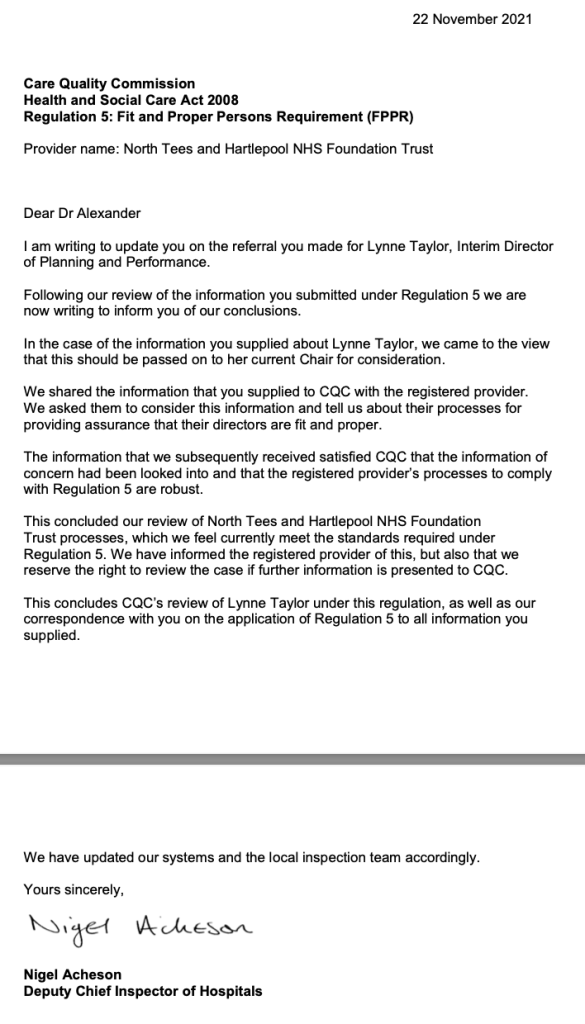By Dr Minh Alexander retired consultant psychiatrist 26 May 2022
Linda Fairhall was a senior nurse of unblemished record who was unfairly dismissed by North Tees and Hartlepool NHS Foundation Trust for making public interest disclosures about safe staffing.
The trust suspended her on trumped up charges. The Employment Tribunal determined that there were no factual grounds for disciplinary action or dismissal, and that those who dismissed Linda Fairhall did not genuinely believe they had a case against her.
“23. In terms of the unfair dismissal claim, the tribunal was not satisfied that the respondent had established that its reason or its principal reason for dismissing the claimant was a reason related to her conduct. Those responsible for the claimant’s dismissal and the dismissal of her appeal did not “genuinely believe” that the claimant had committed any acts of misconduct which are now alleged. There could be no such genuine belief because there were no reasonable grounds for that belief. There could be no reasonable grounds because there had not been a reasonable investigation. The respondent’s decision to dismiss the claimant fell outside the range of reasonable responses open to an employer in all the circumstances of this case. This was an employee of thirty-eight years unblemished service who was suspended from her role in circumstances where that suspension was unjustified and unreasonable. The investigation which followed that suspension was inadequate and unreasonable. The investigation did not produce any qualitative evidence which could have led a reasonable employer to decide to dismiss the claimant in those circumstances, for reasons related to her conduct. The procedure followed by the respondent was unreasonable and unfair. For those reasons the claimant’s complaint of unfair dismissal is well-founded and succeeds.”
Linda Fairhall’s partner died of a heart attack whilst she was unjustly suspended.
She herself was unwell and also a cancer survivor.
She won her Employment Tribunal in January 2020, but appallingly, the trust decided to make her suffer even more by appealing against the finding that her unfair dismissal related to whistleblowing.
What sort of an organisation does that to a bereaved woman, whose partner died whilst it unjustly suspended her? Words are not enough for this additional injury by North Tees.
The Employment Appeal Tribunal noted caustically in its judgment that it was not surprised that the trust had not appealed against a finding of unfair and wrongful dismissal, so “excruciating” were the ET’s detailed findings and laying out of the evidence against the trust.
“In its detailed findings of fact, the Tribunal described in excruciating detail the manifest failings and fundamental unfairness of the respondent in dealing with the claimant’s suspension, the investigation into her conduct, her grievance, her eventual dismissal and the rejection of her appeal.”
Moreover the EAT considered that the ET’s substantive finding of whistleblowing detriment was correct in law. It merely found that the ET could have given fuller reasons for some of its findings of whistleblowing detriment but advised the trust to consider whether it was proportionate to pursue this.
North Tees also persecuted whistleblower Dr Manuf Kassem, who remarkably won an Employment Tribunal in January 2021 for whistleblowing detriment after representing himself.
Mr Kassem raised patient safety concerns and suffered retaliatory disciplinary action. The Employment Tribunal severely criticised the medical director’s detrimental actions against Mr Kassem, which it linked to Mr Kassem’s whistleblowing. Other senior medical staff were also criticised. The ET also determined there was an element of Race discrimination in the trust’s mistreatment of Mr Kassem, and that the trust’s actions amounted to harassment.
As an example of the trust’s egregious mistreatment of Mr Kassem, it launched a fraud investigation into him, but eventually withdrew the allegations. A witness gave this evidence in support of Mr Kassem:
“Mr Tabaqchali concluded his evidence in this respect that he was aware that the claimant “did numerous additional sessions without claiming payments. I therefore think it is a great pity that the directorate has taken this approach rather than thanking him for his hard work and dedication. I would suggest that the directorate overall owe him more pay, not less pay.”
I referred Lynne Taylor, North Tees Director of Planning and Performance,
named in the Linda Fairhall ET judgment to the Care Quality Commission under CQC Regulation 5 Fit and Proper Persons, on grounds of whistleblower reprisal.
As usual, CQC shut down the FPPR referral and gave the trust a pass. This was in November 2021, well after the ET judgment was issued in Mr Kassem’s case. At that point, the CQC should have been aware that North Tees was a recidivist whistleblower victimising organisation.

Lynne Taylor retired from the trust with accolades and flowers, a month before I received the CQC FPPR decision, in contrast to the abusive exit meted out to Linda Fairhall:
Much loved director celebrates her retirement
FOI requests to the trust revealed that the ‘independent’ FPPR process which satisfied the CQC consisted of a panel of three trust directors and two other trust managers reviewing the case.
A pall is cast over this by the trust’s admission under FOI that it was a collective trust board decision to appeal against the ET judgment in Linda Fairhall’s favour.
In other words, a bunch of executives who reportedly did not have the collective common decency to leave a grieving woman alone, and who made her suffer yet another traumatic legal process whilst unwell, were allowed to judge the fitness of a colleague found to have victimised her.
What a perfect picture of rigour and objectivity.
These are the two relevant FOI disclosures from North Tees:
North Tees and Hartlepool NHS Foundation Trust FOI response 8 April 2022 Ref2122(473)
North Tees and Hartlepool NHS Foundation Trust FOI response 11 May 2022 Ref2223(21)
I would have made an FPPR referral last year on North Tees with respect to Mr Kassem’s case but I took a break from campaigning work due to personal commitments.
I have now made a second FPPR referral to CQC on North Tees. I have pointed out to the CQC that North Tees is a recidivist employer, and that the original FPPR process in Linda Fairhall’s case was compromised because it was undertaken by trust directors who were reportedly party to the very poor decision to appeal the ET judgment.
I also recently asked CQC for update FOI information on its regulation of the Fit and Proper Persons provisions.
In response, CQC admitted on 25 May 2022 that since Regulation 5 Fit and Proper Persons came into force in 2014, it has received 147 referrals related to NHS trusts and which included 212 referrals on NHS trust directors.
95 of the 147 referrals on NHS trusts (featuring 108 NHS trust directors) were accepted for consideration by CQC’s FPPR panel, which CQC now admits has never made a single finding of NHS trust non-compliance in the eight years that Regulation 5 has been in force.
CQC has squirmed and tried to soften this stark fact by implying that it would have made findings of non-compliance if some of the individuals had not resigned or been sacked before the completion of its FPPR process.
Well it would, wouldn’t it.
Whistleblowers who have watched in horror as CQC has rubber stamped the likes of Paula Vasco-Knight as a Fit and Proper Person, and failed to learn even when criticised by the PHSO for poor regulatory process, will beg to differ.
And as CQC has been so fond of fobbing off whistleblowers with the mantra that it only regulates the soundness of trusts’ FPPR processes and not the fitness of individuals, it is very unconvincing of CQC to claim that its regulation of FPPR ends when suspect directors depart.
These are the relevant passages from CQC’s FOI response of 25 May 2022:
“Since Regulation 5 of the Health and Social Care Act 2008 (Regulated Activities) Regulations 2014 came into force, a total of 147 of the referrals made to the panel have related to NHS trusts. Some trusts have been referred more than once.
In total, these included 212 referrals of NHS trust directors. In some cases, this includes more than one referral of the same person.
Of the 147 total referrals relating to NHS Trusts, 95 were considered by the panel and these related to 108 directors (including some cases where the same director was referred more than once).
There are a number of reasons why a referral may not have been considered by the panel, for example where the person referred was no longer working in a role within the scope of the regulation or the information shared was not a matter that fell within the scope of regulation 5.”
“It is for the provider to discharge its legal duties under the regulation. FPPR referrals can conclude in a number of ways. For example, an FPPR referral may end where the director resigns from their post before the process has concluded or the director is dismissed through the disciplinary process. For this reason, no FPPR referrals relating to NHS trusts have reached an outcome that the provider is non-compliant with the regulation at the conclusion of the panel process.”
CQC has had the muscle all along to remove unfit directors if it wishes to do so. It told whistleblowers this at a meeting in 2014. This was confirmed by recently disclosed internal CQC audit material:
The question is, why hasn’t CQC removed anybody?
There is more to come about yet another CQC FPPR failure.
PETITION
Accountability is a key plank to preventing future cover ups and whistleblower reprisal.
Please click and add your signature to this petition to reform UK whistleblowing law – whistleblowers protect us all but weak UK law leaves them wholly exposed, lets abusers off the hook and it is a threat to public safety.
Replace weak UK whistleblowing law and protect whistleblowers and the public
RELATED ITEMS
Is there a ‘club culture’ at the heart of the NHS’s quality regulator?
Partly because of CQC’s dismal handling of the Fit and Proper Person regulation, and following Jeremy Hunt’s own version of Mid Staffs disaster at Liverpool Community Health NHS Trust, the Department of Health in 2018 commissioned a report into the Fit and Proper Test in the NHS. This was done by barristers Tom Kark and Jane Russell. NHS Improvement was tasked with implementation but has done little since then. A recent meeting took place which revealed that ultimate approval was still awaited from the DHSC.
Dr Jasna Macanovic’s recent NHS whistleblowing case adds to the pile of managerial recycling scandals. John Knighton the medical director found by the ET to be centrally involved in her premeditated unfair dismissal has been protected by the trust and Mark Cubbon the trust CEO who failed to ensure her protection as a whistleblower has been promoted to a senior post at NHS England.
An FPPR referral has now been made regarding the executive failures in her case.
The Flexible CQC, FPPR & Kettering General Hospital NHS Foundation Trust
Sorry is the hardest word: CQC, Paula Vasco-Knight and Regulation 5 Fit and Proper Persons
Steve Trenchard, NHS regulators & FPPR
FPPR: CQC has lost all moral authority, but what will the National Guardian do?
Postscripts on Paula. NHS England’s apologia & regulatory reticence



Spitefulness is the hallmark of a tyrant.
Spitefulness can be unforgivable in the normal course of events. But, in a “health service,” it is damning.
Your record of the evidence – and those unfortunate creatures responsible – cannot be more incriminatory. And shameful.
I wonder what information the ‘much loved’ retiring director had on those whose duty it was to “support” if not “guide” her? Let’s hope she isn’t so distracted by wallowing in her accolades and gifts for the services she provided that she accidentally entangles herself in Jubilee bunting.
I wish the victims well. Once they recover from the totally unjustified abuse they suffered, undoubtedly a constructive, pleasant and rewarding future beckons.
LikeLike